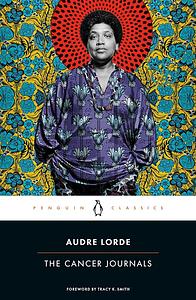You need to sign in or sign up before continuing.
Take a photo of a barcode or cover
reflective
slow-paced
“I do not wish my anger and pain and fear about cancer to fossilize into yet another silence”
In The Cancer Journals, Audre Lorde weaves journal entries and reflections into a powerful memoir-essay about breast cancer and how U.S. society shapes our perception of mastectomy. In 2020, one of my close family members had to get a double mastectomy because of breast cancer. Thankfully, she is cancer-free now, but I’ve found that Lorde’s thoughtful writing helps me process my memories of what her experience with cancer over 2 years ago was like.
Lorde’s critique of prosthesis post-mastectomy was particularly striking. At first, I was wary of this, since my family member herself wears prosthetic breasts now after her surgery. Soon on, however, I understood that the problem is the system that shapes us to believe that mastectomy is something of cosmetic concern, rather than a surgery that can ensure a person’s survival. Ultimately, the explicit encouragement by medical systems for women to wear prosthetics or plan for breast reconstruction after mastectomy reflects a societal view of women as sexualized beings. Are women encouraged to wear prosthetics so that people aren’t uncomfortable with seeing a flat-chested woman? As Lorde explains, she will always be aware that her right breast is a prosthetic, rather than the real thing.
Ultimately, The Cancer Journals is a call for women who have had breast cancer and mastectomies to not let their experiences be made invisible. It is only through the formation of community and support systems that the unfair expectations placed upon women’s bodies can be challenged.
In The Cancer Journals, Audre Lorde weaves journal entries and reflections into a powerful memoir-essay about breast cancer and how U.S. society shapes our perception of mastectomy. In 2020, one of my close family members had to get a double mastectomy because of breast cancer. Thankfully, she is cancer-free now, but I’ve found that Lorde’s thoughtful writing helps me process my memories of what her experience with cancer over 2 years ago was like.
Lorde’s critique of prosthesis post-mastectomy was particularly striking. At first, I was wary of this, since my family member herself wears prosthetic breasts now after her surgery. Soon on, however, I understood that the problem is the system that shapes us to believe that mastectomy is something of cosmetic concern, rather than a surgery that can ensure a person’s survival. Ultimately, the explicit encouragement by medical systems for women to wear prosthetics or plan for breast reconstruction after mastectomy reflects a societal view of women as sexualized beings. Are women encouraged to wear prosthetics so that people aren’t uncomfortable with seeing a flat-chested woman? As Lorde explains, she will always be aware that her right breast is a prosthetic, rather than the real thing.
Ultimately, The Cancer Journals is a call for women who have had breast cancer and mastectomies to not let their experiences be made invisible. It is only through the formation of community and support systems that the unfair expectations placed upon women’s bodies can be challenged.
challenging
dark
emotional
hopeful
informative
inspiring
reflective
sad
medium-paced
challenging
emotional
informative
inspiring
reflective
medium-paced
Gorgeous. A hard look at breast cancer culture, beautifully introspective. Love her mindset.
informative
inspiring
reflective
medium-paced
“I say the love of women healed me.” So, so beautifully written and tremendously moving.
emotional
reflective
fast-paced
A book that I think I would like to reread in print. The audiobook was good, but this book begs to be highlighted and digested. This book is so raw and so well thought out. Lorde is so talented. My grandmother also had a mastectomy, and this made me wish I had been able to talk to her about it more. Such an amazing look at making the personal political.
I've always kind of felt that Lorde wouldn't like me, that she'd think I was too silly or something. Yes, I think about these things. I, however, found this collection gripping. What a hard, strong woman she was.
emotional
informative
reflective
slow-paced
Graphic: Misogyny, Medical content, Medical trauma, Lesbophobia


